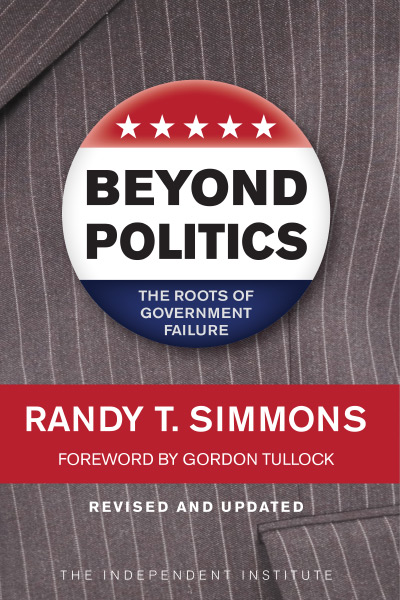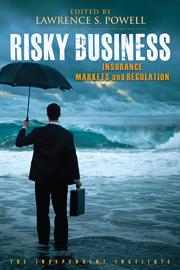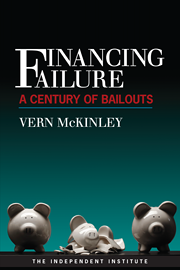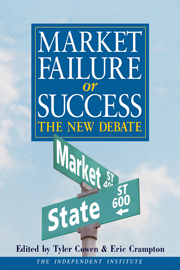| List Price: | ||
| Price: | $25.50 | |
| Discount: | $4.45 (Save 15%) |
| List Price: | ||
| Price: | $25.50 | |
| Discount: | $4.45 (Save 15%) |
Overview
Traditional public policy and welfare economics have held that “market failures”—the presumed inability of a free market to deliver certain goods and services deemed to be in the public interest—are common and require government intervention to protect the public good. But is this actually the case?
Beyond Politics carefully scrutinizes this view through the modern theory of public choice and systematically explains how government is producing a scandal of political myopia, economic stagnation, and public distrust. The book traces the anatomy of “government failure” and a pathology of political institutions. Social welfare, consumer protection, education, trade, the environment, and crime are some of the topics the book examines.
Originally published in 1995, Beyond Politics has been updated to provide readers with insights about the crash of 2008, America’s fiscal crisis, and other realities of twenty-first century political economy. Offering a powerful perspective on market processes, property rights, politics, and government bureaucracy, this newly revised and updated edition is a lucid and comprehensive examination of the foundations of a free and humane society.
Contents
Illustrations
Preface
Introduction
PART I: Market Failure and Political Solutions: Orthodoxy
- Market Failure and Government Intervention: The View from Welfare Economics
- Political Presuppositions of the Idealized State
PART II: In Dispraise of Politics: Some Public Choice
- Undemocratic Side of Democracy
- Pathological Politics: The Anatomy of Government Failure
- Politics of Free and Forced Rides: Providing Public Goods
PART III: Understanding Property, Markets, the Firm, and the Law
- Private Property and Public Choice
- Rediscovering Markets, Competition, and the Firm
- Public Choice and the Law
PART IV: Case Studies in the Anatomy of Government Failure
- Political Pursuit of Private Gain: Producer-Rigged Markets
- Political Pursuit of Private Gain: Consumer Protection
- Political Pursuit of Private Gain: Government Exploitation
- Political Pursuit of Private Gain: Government Schools and Mediocrity
- Political Pursuit of Private Gain: Environmental Goods
- Political Pursuit of Private Gain: Coercive Redistribution
- Micro-Politics of Macro-Instability
PART V: Political Implications of Public Choice
- Creating a Climate for Liberty
Index
Detailed Summary
- Market failure versus government failure. Social and economic problems are often attributed to the failings of the market economy, though they frequently result from failed government policies. For example, pollution and other environmental problems often arise from the government not defining and enforcing private-property rights adequately. Economic recessions result from the burst of asset bubbles fostered by the government’s promotion of risky, unsustainable investments. Another example: the growth in social welfare caseloads stems in part from the failings of government schools, regulatory obstacles to labor-force participation, and public policies that hinder the accumulation of savings. Political decision-makers—ordinary voters and government officials alike—need a strong grasp of the limitations of the political process and the roots of government failure.
- The causes of government waste. It is often acknowledged that government is inefficient, but seldom are the sources of those inefficiencies clearly identified. Sources include (1) the perverse incentives facing politicians, bureaucrats, special interests, and voters/consumers; (2) the collective provision of private wants, such that benefits accrue to the few but costs are borne by the many; (3) deficient signaling, as when electoral victories are mislabeled as “voter mandates”; (4) electoral rules and the distortion of preferences; (5) institutional myopia that neglects, for example, the needs of future generations; (6) dynamic difficulties caused by uncertainties generated by government policies; (7) and policy symbolism, such as political posturing.
- The failure of government poverty-reduction programs. Government failure is evident in areas as different as consumer protection and macroeconomic policy. One area where its failure is especially clear (although politicians seldom discuss this) is in fighting poverty. The U.S. welfare state has made little headway in poverty reduction despite billions of federal dollars spent in the name of helping the poor. One reason has been the high cost of administering social welfare programs. In 2004, combined federal outlays for Temporary Aid for Needy Families, Food Stamp benefits, Supplemental Security Income benefits for nonelderly recipients, the Earned Income Tax Credit, and the federal share of Medicaid spending for nonelderly people averaged $7,776 per citizen living in poverty—far more than the amount needed to lift a recipient’s income above the official poverty line. (Based on 2005 Census Bureau statistics, that amount would have required an average expenditure of only $2,299 per person living in a family and $5,295 per person not living in a family.)
- Reclaiming the virtues of the market. Markets solve more social and economic problems than we give them credit for—and would work better if they were allowed to operate freely. Markets enable individuals to frequently express the intensity of their preferences on practically unlimited combinations of goods and services, whereas politics only allows voters to express a preference for one candidate over a few others every few years. Markets, however, are not free to work their magic (i.e., enhance social order by rewarding alertness to opportunity) unless consumers are free to choose and businesses are disciplined by the competitive quest to earn profits and avoid losses. Free-market prices, freedom of entry into (and exit from) a market, and the enforcement of contracts and property rights are crucial pillars of effective markets.
Social and economic problems are usually met with calls for the government to “do something,” especially when the causes are believed to stem from the failures of a market economy. Unfortunately, good intentions don’t ensure good results: government “solutions” often make things worse. Why is this the case? And how should public policies be formulated so as to reflect the limitations of government activism?
In Beyond Politics: The Roots of Government Failure, political scientist Randy T. Simmons shows why political and bureaucratic attempts to correct the problems of so-called market failure often result in inadequate, even counterproductive outcomes. The causes of that common malady are not especially hard to grasp, but doing so, Simmons argues, requires that we recognize the flaws of orthodox assumptions about politics and markets—and that we understand the institutional framework that shapes our government and economy. After laying this groundwork, Simmons exposes the roots of government failure in case studies of producer-rigged markets, consumer protection, government exploitation, public education, environmental protection, social welfare, and macroeconomic policy. He concludes by drawing out the core lessons of this analysis and offering four guidelines to improve public policy and create a climate for liberty.
Originally published in 1995 with co-author William C. Mitchell, Beyond Politics has been revised and updated to provide readers with insights about the crash of 2008, America’s fiscal crisis, and other realities of twenty-first century political economy. Academics will find it a refreshing synthesis of the burgeoning field of public choice, and practitioners of the dark arts of policy-making will find it a treasure trove of cautionary tales that illustrate the adage, “Fools rush in where angels fear to tread.” After reading Beyond Politics, no one will ever be surprised to see public-policy outcomes diverge, often tremendously, from political promises—and no reader will lack useful ideas about how to improve the public sphere.
Market Failures and Political Solutions
During the past century, rent control, pollution regulation, safety rules, import restrictions, fuel economy standards, and thousands of other controls were enacted to overcome perceived imperfections in markets. In fact, “market failure” has become the leading justification for government intervention in the economy.
Why are markets said to fail, and why is government activism offered as the remedy? Chapter 1 addresses the question by explaining the orthodox view of “market failure” and related concepts, such as “negative externalities” (i.e., spillover costs borne by third parties), “public goods,” “imperfect competition,” “system-wide economic stability,” and “transaction costs.” Chapter 2 traces the development of a view of democracy taught widely in American schools: the “pluralist” theory that politicians and bureaucrats merely implement voter preferences and that political competition tends to produce policies that serve the public interest.
In Dispraise of Politics
The orthodox views of market failure and the idealized conception of the state, which have shaped policymaking and analysis since the mid twentieth century, are deeply flawed: among other shortcomings, chapter 3 explains, they fall short in explaining government failure. Fortunately, a social science developed over the past several decades provides breakthrough insights about this phenomenon.
Public choice, chapter 4 explains, is an academic discipline that applies economic reasoning and analysis to the study of politics. Rather than ask: what would we like for people to do in the political realm? it asks: what are people likely to do, given the incentives and constraints that they face? Public choice analysts have used this approach to identify the causes of government failure in numerous areas of public policy.
Their core finding can be boiled down to one sentence: government intervention often makes a problem worse, not because government workers are particularly lazy or incompetent (in fact, many work very hard and conscientiously), but because we demand more from government than it can handle well. One key reason is that elected officials, bureaucrats, voters/consumers, and special interests lack sufficient knowledge and incentives to intentionally promote the public interest.
These deficiencies become apparent when we scrutinize the government’s provision of so-called public goods, the topic of chapter 5. The term public goods is technical jargon in economics: it refers to goods and services that many people (free riders) would enjoy without having to purchase, and that for-profit firms would therefore not supply adequately (a textbook case of market failure). But government provision of public goods is no panacea: it is often plagued by problems that arise from non-market pricing, bureaucratic allocation, and overcrowding/overuse by consumers.
Property, Markets, Competition, and the Law
Sound policymaking requires an understanding of the subtleties of seldom-discussed institutions that shape the public sphere. Property rights, chapter 6 explains, act as a set of behavioral rules that guide social interaction. Thus they create incentives to consider other’s values as we pursue our own ends, and they create a platform for conflict resolution. Property rights can determine, for example, whether individuals take care of trees (or cause desertification) and whether neighboring homeowners will cooperate on issues that affect all of them (or bicker among themselves).
Property rights also shape the performance of markets and businesses, the topics of chapter 7. Economists have improved our understanding of these institutions in recent decades. Markets are best seen as a “discovery process” that generates and spreads information useful to consumers and producers alike. Market prices communicate subtle trade-offs and coordinate human action with amazing speed and efficiency. Competition and profit seeking are essential components of the market process.
How well property rights are defined and enforced depends in part on the structure of the legal system. Chapter 8 discusses the incentives that judges and lawyers face (as well as the incentives embedded in the common law and in statutory law) and their effects on legal outcomes.
Case Studies
Protecting consumers, the environment, the poor, and workers are widely shared values, but advancing these goals politically often yields greater costs than benefits. Consider the case of cartels and monopolies, the subject of chapter 9. Business leaders often lobby for laws and regulations designed to reduce competition at the expense of customers and potential rivals. Their desire, often cloaked in the language of “the public interest,” is to reap profits that exceed the amount they would earn in a free market, but their goal may prove elusive: the money spent to acquire and defend their protected status may wipe out any gains they hoped to enjoy.
Anti-competitive policies designed to protect established firms and other interest groups often come in the guise of consumer-protection laws. Occupational licensing requirements, import quotas, motor vehicle gas mileage standards, vehicle safety inspection laws, and state liquor stores are examined in chapter 10. Chapter 11 looks at how politicians and bureaucrats advance their own special interests through taxation, red tape, and agenda control.
Educating students and protecting natural resources are services that many believe are best handled by government, but government schools and environmental policies are often inadequate. Chapter 12 examines the effects of a lack of consumer choice on school performance. Chapter 13 shows how political priorities, and poorly defined property rights, contribute to environmental problems. It also shows how market-based policies (e.g., clean air and water markets) have improved environmental quality.
Coercive redistribution has played a growing role in the United States. In 2008, 24 percent of U.S. households received aid from means-tested programs. By 2007, 53 percent of U.S. citizens received direct benefits from the government, such as Social Security, Medicare, unemployment compensation, educational assistance, and veterans’ benefits. Chapter 14 examines some of the perverse effects these trends have created.
Many individuals might believe that fostering a stable economic climate would be a goal less impaired by political interests. Chapter 15, however, explains the incentives for deficit financing and examines evidence for the political manipulation of business cycles. Even without the “incentive problem,” macroeconomic policymakers would be overwhelmed by a “knowledge problem”: they lack all the information they would need to effectively manage the entire economy.
A Climate for Liberty
The reformer’s standard call is for the removal of “waste, fraud, and abuse” from various government programs. In fact, the problem goes deeper. Politics as such is problematic: it is often a ruthless competition for power to benefit particular interests at the cost of others.
What is to be done? Earlier chapters offered specific policy proposals, but chapter 16 takes a broader view and discusses general principles that provide a sound alternative to the negative-sum game of politics and bureaucracy. These principles are: limiting the scope and power of government, allowing markets to handle problems, fostering freedom, and establishing the rule of law.
These four principles build on the book’s earlier observations about the beneficial aspects of property rights, market processes, and private institutions. Embracing them would make for a more rational and peaceful polity. They are also wholly in keeping with the American political heritage of decentralized government and individual liberty.
Praise
“Beyond Politics is a superb, thought-provoking and penetrating book, analyzing the real, as opposed to the presumed, effects of government regulation. This outstanding book deserves to be read by all serious students of government policy.”
—Sam Peltzman, Ralph and Dorothy Keller Distinguished Service Professor of Economics Emeritus, University of Chicago
“Beyond Politics is a lively book that very effectively analyzes the very real phenomena of government failure. . . . The authors make a significant contribution by dealing informatively with the side of the matter that welfare economics tends to neglect and make a vigorous case for the view that government intervention in the workings of the market should never be taken lightly.”
—William J. Baumol, Director, C. V. Starr Center for Applied Economics, New York University
“Beyond Politics is a major contribution to informed comment. The book is so well written and the subject is so important and exciting that a great many people will find it very entertaining even if they do learn while reading it. We can welcome the book as a major step forward in understanding the dynamics of government and markets, and how both affect us all.”
—Gordon Tullock, University Professor Emeritus of Law and Economics and Distinguished Research Fellow, George Mason University
“Throughout the world, publics are looking for a new conception of government and its role. Happily, there is a whole new theory that fills the bill called ‘public choice,’ and which is clearly and persuasively presented in the excellent book, Beyond Politics.”
—Robert L. Bartley, Pulitzer Prize winner and late Editor, The Wall Street Journal
“Simmons make[s] a lucid case for a market economy and limited constitutional government. Beyond Politics is the most effective introduction to this topic that is now available.”
—William A. Niskanan, late Chairman Emeritus and Distinguished Senior Economist, Cato Institute; former Chairman, President’s Council of Economic Advisors
“Beyond Politics is a solid work in all respects. Truly a praiseworthy book, it is well written and carefully organized, providing a rich contrast between orthodox notions of democracy and the public choice alternative.”
—Richard E. Wagner, Hobart R. Harris Professor of Economics, George Mason University
“Beyond Politics is a valuable analysis, making a cogent case for thoroughly rethinking what government should do. The book deserves wide reading.”
—John Engler, former Governor of Michigan
“Beyond Politics is so well written and interesting that it appeals even to those, like me, who may disagree with several of its arguments.”
—Mancur Olson, Jr., late Distinguished Professor of Economics, University of Maryland
“We have needed an answer to the question often asked: ‘Can you refer me to a single book that will explain in simple language what Public Choice is all about?’ Beyond Politics . . . meets this need superbly. The authors have assembled the required understanding of both economics and politics that allows them to get straight to the important elements involved.”
—James M. Buchanan, Nobel Laureate in Economic Science; Distinguished Professor Emeritus, George Mason University
“Beyond Politics is a comprehensive and up-to-date account of the failures of U.S. governmental policies, with important suggestions for how to correct them. The book is a thorough introduction to what is wrong with America’s political system with remedies for its failure.”
—Dennis C. Mueller, Professor of Economics Emeritus, University of Vienna
“The best primer on political reality, Beyond Politics will revolutionize your thinking!”
—Pierre S. DuPont, IV, former Governor of Delaware
“Simmons ha[s] . . . done an outstanding job of illuminating the inefficient allocation of public resources in the face of politicians, bureaucracies and interest groups. Beyond Politics explains how and why the forces work in a constant struggle among these three elements in the continuum of public policy battles and why bureaucratic institutions are unable to deliver on their promises at the intersection of politics and economics.”
—James C. Miller III, former Chairman, Federal Trade Commission; former Director, Office of Management and Budget
“In Beyond Politics, Randy Simmons ha[s] . . . written an accessible and compelling account of the major issue of our time—the intersection of politics and the market. With great care they first develop and then demolish the standard arguments about market failure that are commonly taken to justify the creation of a vast government bureaucracy. They show how the forces of self-interest are given a new destructive range in political and administrative settings that allow interest groups, politicians and bureaucrats to enhance their own position at the expense of the public at large. And they illustrate their basic point with countless well-chosen examples of bureaucratic misdeeds that should make even the most ardent defenders of big government question the soundness of the ever-expanding welfare state.”
—Richard A. Epstein, Laurence A. Tisch Professor of Law, New York University; James Parker Hall Distinguished Service Professor of Law Emeritus, University of Chicago
“Beyond Politics is a cogent and readable book examining what public choice is all about.”
—Norman J. Ornstein, Resident Scholar, American Enterprise Institute
“Economics is full of people who know that markets work, but seem amazed that politicians are not following their advice. The authors of Beyond Politics make the important point that intervention in the face of ‘market failure’ does not necessarily lead to a better state of affairs. Their insight that government can fail too, and fail in ways that are subject to systematic analysis, is a most valuable contribution to the debate over public policies.”
—Glenn C. Loury, Merton P. Stoltz Professor of the Social Sciences and Economics, Boston University
"Beyond Politics: Markets, Welfare, and the Failure of Bureaucracy is the best non-Ph.D.-level summary of the basic insights of public-choice scholarship."
—Donald J. Boudreaux, Professor of Economics, George Mason University
“ There is a need for a public philosophy that would provide a framework for discussion of appropriate spheres for markets and government. One such philosophy might begin with recognition of the desirable features of markets and also of the possibilities of market failure. But it would build on material such as is in this book to identify
the risks of government failure, that is, the possibility that government intervention may well make things worse. Such a philosophy could provide a basis for communication and discourse and a framework for reasoned disagreement between people with diverse points of view about the goals of public life. The seeds of such a public philosophy are to be found in this book.”
—American Political Science Review
“The book is well written, . . . That is why this book should be highly recommended for a course in economics at the junior or senior level. In fact, a curriculum in economics that does not include the subject matter covered by Simmons . . . will be, at least, questionable in its quality. Those who do read the book will come out with what may be considered the most important lesson of Beyond Politics: Governments rely on force, and when force is wielded for political purposes the government becomes the worst violator of individual rights. Such lessons in liberty and freedom are badly needed in contemporary American economic education. This book fills this void more than satisfactorily.”
—Public Choice
Awards
- One of the Five Best Books on Public Choice
- Honorable Mention in “Reference” Category (2011 Revised Edition)
1995 Sir Antony Fisher International Memorial Award (Awarded by the Atlas Economic Research Foundation)
- Third Place (1995 First Edition)
















